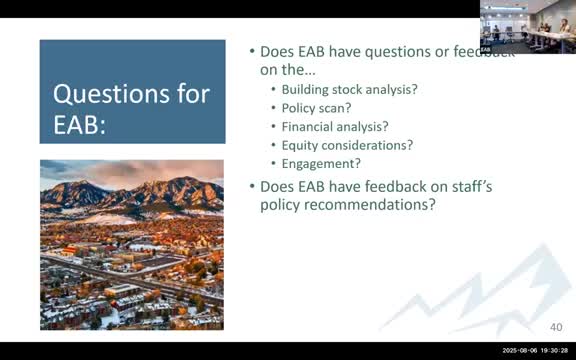City Evaluates Building Performance Standards to Reduce Emissions and Costs
August 08, 2025 | Boulder, Boulder County, Colorado
Thanks to Scribe from Workplace AI , all articles about Colorado are free for you to enjoy throughout 2025!

This article was created by AI using a video recording of the meeting. It summarizes the key points discussed, but for full details and context, please refer to the video of the full meeting. Link to Full Meeting
During the meeting, it was noted that while the upfront costs of improving building efficiency may be high, the long-term benefits could outweigh these expenses. A focus on the largest buildings—approximately 50 out of 400 identified—could lead to significant reductions in emissions. However, the board acknowledged that retrofitting these structures would require considerable financial investment, as more efficient equipment tends to be pricier than standard replacements.
The discussion also touched on the importance of exploring various funding sources, such as rebates and grants, to alleviate the financial burden on property owners. Board members expressed a commitment to transparency regarding the costs associated with emissions reduction efforts, recognizing that while some investments may not yield immediate paybacks, they are essential for achieving broader climate goals.
In addition to addressing high-emission buildings, the board discussed the need to enhance the resilience of lower-emission structures, ensuring they are prepared for future climate challenges. This dual approach aims to tackle emissions from both ends of the spectrum, balancing immediate financial impacts with long-term societal benefits.
The meeting underscored the ongoing challenge of updating regulations and codes to meet environmental targets. As Boulder City continues to refine its strategies for emissions reduction, the board's discussions will play a crucial role in shaping future policies and community outreach efforts. The anticipated next steps include further analysis of funding options and continued engagement with stakeholders to ensure a comprehensive approach to building performance standards.
Converted from 8-6-25 Environmental Advisory Board Meeting meeting on August 08, 2025
Link to Full Meeting
Comments
View full meeting
This article is based on a recent meeting—watch the full video and explore the complete transcript for deeper insights into the discussion.
View full meeting
